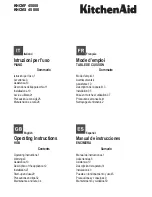
-10-
P
P
P
P
a
a
a
a
rr
rr
tt
tt
2
2
2
2
::
::
F
F
F
F
o
o
o
o
rr
rr
tt
tt
h
h
h
h
e
e
e
e
u
u
u
u
s
s
s
s
e
e
e
e
rr
rr
TYPE OF DIRT
Slight
Accumulation of burner-on
grime
Rings and lime scale
Burnt-on sugary food, melted
aluminium or plastic
WHAT TO DO
OTHER PRODUCTS TO
USE
Soak the area to be cleaned with hot
water, then wipe.
Ordinary sponge
Soak
the area to be cleaned with
hot
water
, wipe with the abrasive side of a
sponge if necessary, then wipe.
Ordinary sponge
•
Apply
hot white vinegar
to the
mark, leave to work, then
wipe
with a
soft cloth.
•
Or use a
special product
available
in the shops.
Special paste for
vitro-ceramic glass
•
Use a
special scraper
for glass
surfaces to remove as much residue as
possible
•
Or apply a
special product
for
vitro-ceramic glass, preferably one
which contains silicones (to protect the
glass).
Special product for
vitro-ceramic glass
Never clean your
hob while it is on.
Turn all the controls
to 0 first.
H
HO
OW
W T
TO
O C
CL
LE
EA
AN
N Y
YO
OU
UR
R H
HO
OB
B
●
●
cream
ordinary sponge
or special sponge for delicate
items
powder
abrasive-backed
sponge
If sugar, jam, jelly, etc boils over, the spills should be scraped
off the hot cooking zone immediately to prevent damage to the
surface of the hob.
•
Use pans designed for use on an electric
cooker.
Use pans with flat bases which remain in
contact with the surface of the ring:
- in stainless steel with a thick three-ply or
"sandwich" base.
A
AC
CC
CE
ES
SS
SO
OR
RIIE
ES
S
●
●
•
in aluminium with a thick smooth base. Please
check with the manufacturer that they are
suitable to use on ceramic hobs.
- in enamelled steel
Pans with very rough bases may pick up and
carry material which could stain or scratch the hob.


































